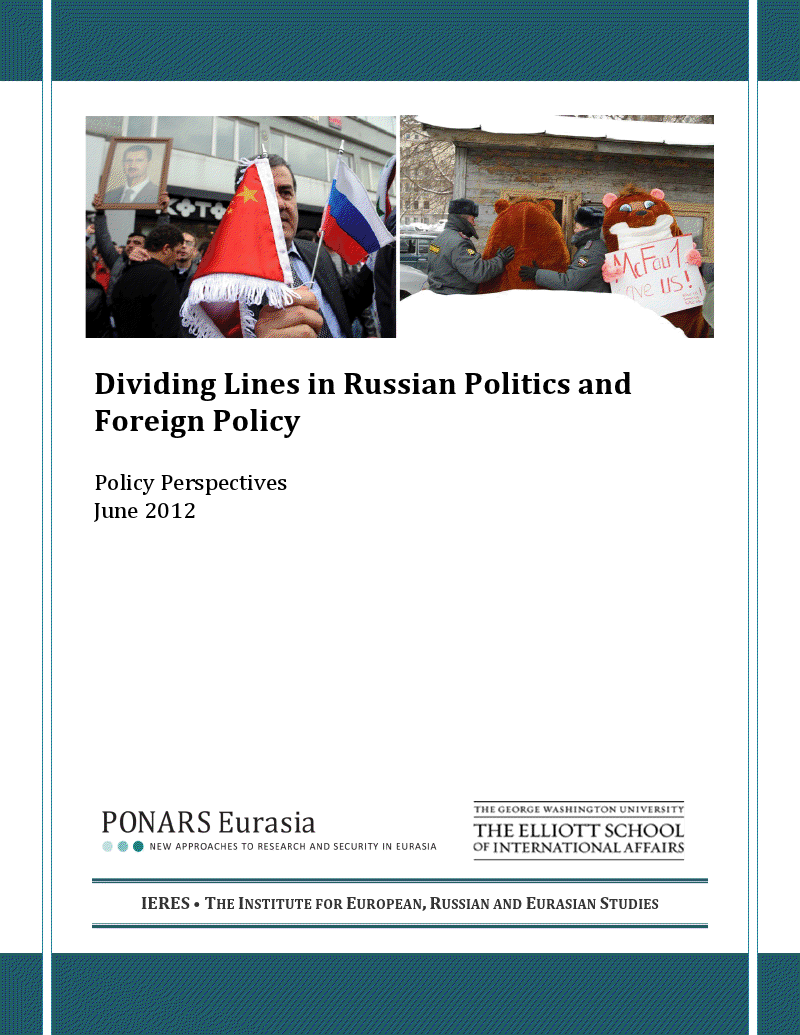Foreword
By Cory Welt
George Washington University
This collection of policy memos is based on the proceedings of a May 2012 workshop of the Program on New Approaches to Research and Security in Eurasia (PONARS Eurasia), held in collaboration with the Centre for EU-Russia Studies at the University of Tartu in Estonia. PONARS Eurasia is an international network of academics that advances new policy approaches to research and security in Russia and Eurasia.
The workshop, “Continuity and Change: Examining Regime Trajectories and Security in East Europe and Eurasia,” brought together scholars and experts based in the United States, the Russian Federation, and Estonia, as well as Armenia, Canada, Germany, Georgia, Kyrgyzstan, and Ukraine. Participants assessed the interplay between domestic and foreign policies in Russia, predicted possibilities for change in Russia’s current political-economic structure, and identified challenges to and potential avenues for collaboration across various Eastern European divides. We are publishing a number of policy memos from the workshop in two collected volumes, of which this is the first.
This volume, Dividing Lines in Russian Politics and Foreign Policy, examines the interplay between domestic and foreign policies in Russia and the possibilities for change in the country’s current political-economic structure. Part I of the collection describes how the Russian government has sought to delegitimize regime opponents through the taint of foreign conspiracy, assesses the responses of those so targeted, and analyzes how efforts to polarize society have begun to have the unintentional effect of helping legitimize internal dissent. Serghei Golunov examines the rise of conspiracy theorizing as an element and tool of Russian politics, the return of “Washington” as an allegedly key political actor in Russia’s 2011-2012 campaign season, and the limited success of dissidents and political opponents to free themselves from the stigma of conspiracy. Viatcheslav Morozov takes a more optimistic view that regime opponents have been able to undermine – and even reverse – the stigma of being “outsiders” in Russian society. However, he cautions against leaping to conclude that those who advocate liberal democratic reforms already enjoy widespread support across Russian society.
The four memos in Part II ask whether it is reasonable to expect Russia’s recent political ferment to lead to major changes in the country’s key political-economic structures. Samuel Greene is largely pessimistic, arguing that Russia’s closed political- economic structure is highly resilient and well-organized to combat systemic reform. This, he says, increases the possibility of more unpredictable revolutionary change, which might only be averted by the efforts of two key potential constituencies for gradual change—high-level government officials that no longer control the commanding heights of Russian business and the stability-seeking Vladimir Putin himself. In contrast, Gulnaz Sharafutdinova finds hope through historical parallel—the United States’ own 19th century Progressive Era, which made great strides in tackling corruption and promoting good governance. She argues that Russia today enjoys many prerequisites for its own Progressive Era, including a dedicated reform-minded class that has the potential to alter social understandings of how the Russian state should—and can—be run. Juliet Johnson identifies three main obstacles to a successful state-run modernization policy in Russia: its closed political-economic structures; policy responses to the global financial crisis that reinforced these structures; and the constraints Putin faces in reforming the system at a time of decreased political legitimacy. Barring fundamental change, she proposes, the Russian government would be better off maintaining focus on improving Russia’s oil and gas sector than in embarking on a quixotic modernization drive. Finally, Robert Orttung and Irina Olimpieva assess the emerging political role of Russia’s labor unions: their interest in electoral politics, their dissatisfaction with the status quo, and the opportunities and challenges for developing political parties on the basis of labor organization.
Finally, Part III makes sense of contemporary Russian foreign policy in the Middle East, Syria in particular. Dmitry Gorenburg acknowledges that Russia has an economic interest in having the current Syrian regime stay in power. However, he argues, Russian policy toward Syria and other cases of unrest in the Middle East has been driven more by other sentiments: a fear of greater U.S. influence in the region, a desire to avoid establishing an international norm in favor of regime change, and a perceived need to prevent a wave of popular and, in part, Islamist-inspired revolution from approaching Russia’s shores. Ekaterina Stepanova focuses more on specific characteristics of Russia’s foreign policymaking structures and regime affinity than on well-articulated interests. She contends that Russian foreign policy can be explained mainly as a product of slow-moving institutions; national consensus on a few key tenets; and the habits and practices of Russia’s dominant political caste. Beyond this, she identifies a unique basis for this caste’s support for the Syrian regime in particular—the understanding that of all the contested or fallen regimes in the Middle East, Syria’s is the one that most resembles their own.
We are sure you will find these policy perspectives useful and thought- provoking. Many individuals were instrumental in the production of this volume, as well as the organization of the workshop that generated it. I would like to especially thank our colleague and co-organizer, University of Tartu Professor Viatcheslav Morozov; Managing Editor Alexander Schmemann; Program Coordinator Olga Novikova; Graduate Research Assistants Wilder Bullard and Justin Caton; IERES Executive Associate Caitlin Katsiaficas; and IERES Director Henry Hale. PONARS Eurasia, together with the George Washington University’s Elliott School of International Affairs, expresses its deep appreciation to the International Program of Carnegie Corporation of New York and the John D. and Catherine T. MacArthur Foundation for their ongoing support.











